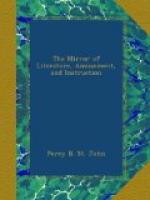where are all these, or any similar, “merry
disports” in our degenerate days? We have
no “lords of misrule” now; or, if we have,
they are of a much less innocent and pacific character.
Mr. Cambridge, also, (No 104, of the World)
draws a glowing picture of an ancient Christmas.
“Our ancestors,” says he, “considered
Christmas in the double light of a holy commemoration
and a cheerful festival; and accordingly distinguished
it by devotion, by vacation from business, by merriment
and hospitality. They seemed eagerly bent to
make themselves and every body about them happy.
With what punctual zeal did they wish one another
a merry Christmas! and what an omission would it have
been thought, to have concluded a letter without the
compliments of the season! The great hall resounded
with the tumultuous joys of servants and tenants,
and the gambols they played served as an amusement
to the lord of the mansion and his family, who, by
encouraging every art that conduced to mirth and entertainment,
endeavoured to soften the rigour of the season, and
to mitigate the influence of winter. How greatly
ought we to regret the neglect of mince-pies, which,
besides the idea of merry-making inseparable from
them, were always considered as the test of schismatics!
How zealously were they swallowed by the orthodox,
to the utter confusion of all fanatical recusants!
If any country gentleman should be so unfortunate
in this age as to lie under a suspicion of heresy,
where will he find so easy a method of acquitting
himself as by the ordeal of plum-porridge?”
This alludes to the Puritans, who refused to observe
Christmas, or any other festival of the church, either
by devotion or merriment. And I regret to say
there are certain modern “fanatical recusants,”
certain modern Puritans, as schismatical in this particular
as their gloomy precursors. Mr. Cambridge then
proceeds “to account for a revolution which
has rendered this season (so eminently distinguished
in former times) now so little different from the
rest of the year,” which he thinks “no
difficult task.” The reasons he assigns
are, the decline of devotion, and the increase of
luxury, the latter of which has extended rejoicings
and feastings, formerly peculiar to Christmas, through
the whole year; these have consequently lost their
raciness, the appetite for amusement has become palled
by satiety, and the relish for it, reserved formerly
for this particular season, is now no longer peculiar
to it, having been already dissipated and exhausted.
Another cause he assigns is, “the too general
desertion of the country, the great scene of hospitality.”
Now this was written just fifty-three years ago, and
as all the causes assigned for the declension of this
grand national festivity up to that period are incontrovertible,
and have been operating even more powerfully ever
since, they will sufficiently account for the still
greater declension observable in our days. And
the declension appears to me to consist in this,—there
is more gastronomy and expanse, but less heartiness
and hospitality; and these latter are the only legitimate
characteristics of Englishmen. Be they then restored,
this very Christmas, to the English character; the
opportunity is fast approaching—be it employed.




